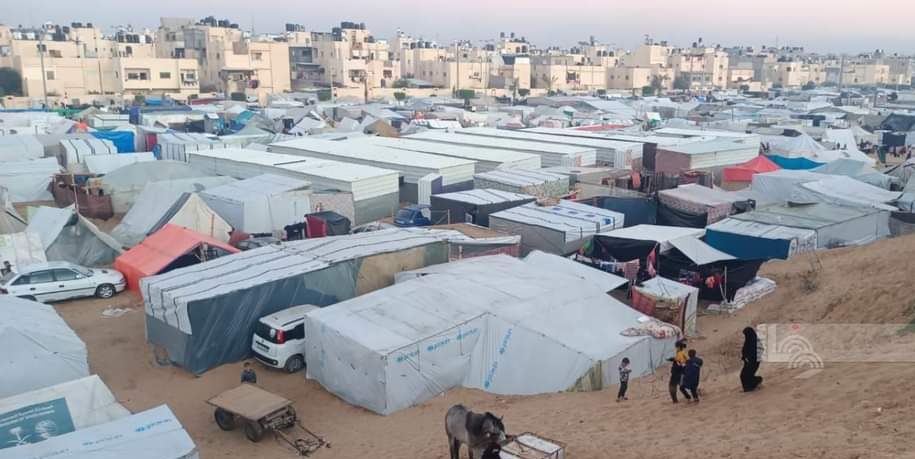Qatar has condemned on Saturday the Israeli army’s plans to attack Rafah in the southern Gaza Strip.
Qatar has condemned Israel’s threats to invade Rafah in southern Gaza where more than one million people have been taking shelter, urging the United Nations Security Council to prevent Israel from “committing genocide”, Doha’s foreign ministry said in a statement on Saturday.
“Qatar condemns in the strongest terms the Israeli threats to storm the city of Rafah in the southern Gaza Strip, and warns of a humanitarian catastrophe in the city that has become a last refuge for hundreds of thousands of displaced people inside the besieged Strip,” the statement read.
Israel was planning on expanding its ground invasion in Gaza to Rafah, the last remaining area in the besieged enclave where 1.3 million displaced people have been sheltering after they evacuated from northern and central Gaza.
Israeli military chief Yoav Gallant said on February 1 that Israel will expand its ground invasion to Rafah. Israeli Prime Minister Benjamin Netanyahu’s office then issued a statement on February 9 saying it was keen on “eliminating Hamas by leaving four Hamas battalions in Rafah.”
Netanyahu also ordered the Israeli military “to submit to the Cabinet a combined plan for evacuating the population and destroying the battalions”. Rafah has already been subjected to deadly bombardment since last week after Israel carried out deadly attacks in Khan Younis.
The Israeli invasion would only displace Palestinians outside of Gaza to neighbouring Egypt, which shares the Rafah Crossing with the Palestinian side.
However, entry and exit through Rafah has been a challenge given the heavy restrictions in place by Israeli and Egyptian authorities.
Speaking in Washington on February 8, U.S. President Joe Biden said that Egyptian President Abdel Fattah El-Sisi “did not want to open up the gate to allow humanitarian material to get in”, without mentioning the movement of people in and out of Gaza.
Egypt then dismissed Biden’s remarks the following day, maintaining that it has worked on delivering aid “from the first moment” and Rafah has been open from its side “without any restrictions.”
The Egyptian presidency had said that the “persistent bombing of the Palestinian side of the crossing by Israel” hindered the flow of aid, without mentioning the evacuations of Palestinians from Gaza.
The latest threats to invade Rafah have raised concerns among the region, including countries mediating a possible ceasefire in Gaza, namely Qatar and Egypt.
Qatar’s foreign ministry called “on the UN Security Council to take urgent action to prevent the Israeli occupation forces from invading Rafah and committing genocide, and to provide full protection to civilians under international law and international humanitarian law.”
Other countries and international bodies have issued statements expressing their concern over the dangerous Israeli plans.
Saudi Arabia’s foreign ministry issued a statement on Saturday warning “of the very serious repercussions of storming and targeting the city of Rafah in the Gaza Strip.”
“This continued violation of international law and international humanitarian law confirms the need for an urgent convening of the UN Security Council to prevent Israel from causing an imminent humanitarian disaster,” Riyadh said.
UN Secretary-General Antonio Guterres described the latest plans “to focus next on Rafah are alarming.”
“Such an action would exponentially increase what is already a humanitarian nightmare with untold regional consequences,” Guterres said in a post on X on Friday.
Israel-Egypt tensions
Israel’s planned move in Gaza has appeared to threaten its ties with Egypt, The Wall Street Journal reported on February 9, citing a top Western diplomat.
Egyptian officials reportedly warned Israel, through Western intermediaries, that the displacement of Palestinians from Gaza to the Sinai Peninsula would prompt Cairo to suspend its peace treaty with Tel Aviv.
Despite being the first Arab country to normalise ties with Israel, tensions between both sides soared ever since the beginning of the genocidal war in Gaza on October 7, 2023. Israel has since killed more than 28,000 people while wounding 67,611 others.
Israel has also been calling for Israeli control of the Philadelphi Corridor, a land that marks the border between the Gaza Strip and Egypt.
The Philadelphi Corridor was initially a buffer zone under the Egypt-Israel 1979 peace treaty that ended the Israeli occupation of Egypt’s Sinai Peninsula. The zone aimed at preventing weapons from reaching Palestinians in Gaza, which was under Israel’s occupation at the time.
Israel’s withdrawal from Gaza in 2005 granted Egypt complete control over Philadelphi. The corridor then became the besieged enclave’s portal with the outside world under the Israeli blockade of 2007.
Israel’s latest threats come as mediation efforts over another possible truce and captives release deal reach a critical stage.
Hamas announced on Thursday that it had sent a delegation to Cairo to follow up on the latest proposal on the table after Israel rejected the group’s demands for a complete withdrawal from Gaza and a ceasefire.
“In the context of our keenness to achieve the best results in a way that serves the interests of our people, stops their suffering, and alleviates their pain[…]lifting the siege, and launching reconstruction; we confirm that a delegation from the movement’s leadership, headed by Dr. Khalil Al-Hayya will head to Cairo to follow up on this matter,” Hamas’s spokesman Osama Hamdan told a press conference in Beirut on February 7.







